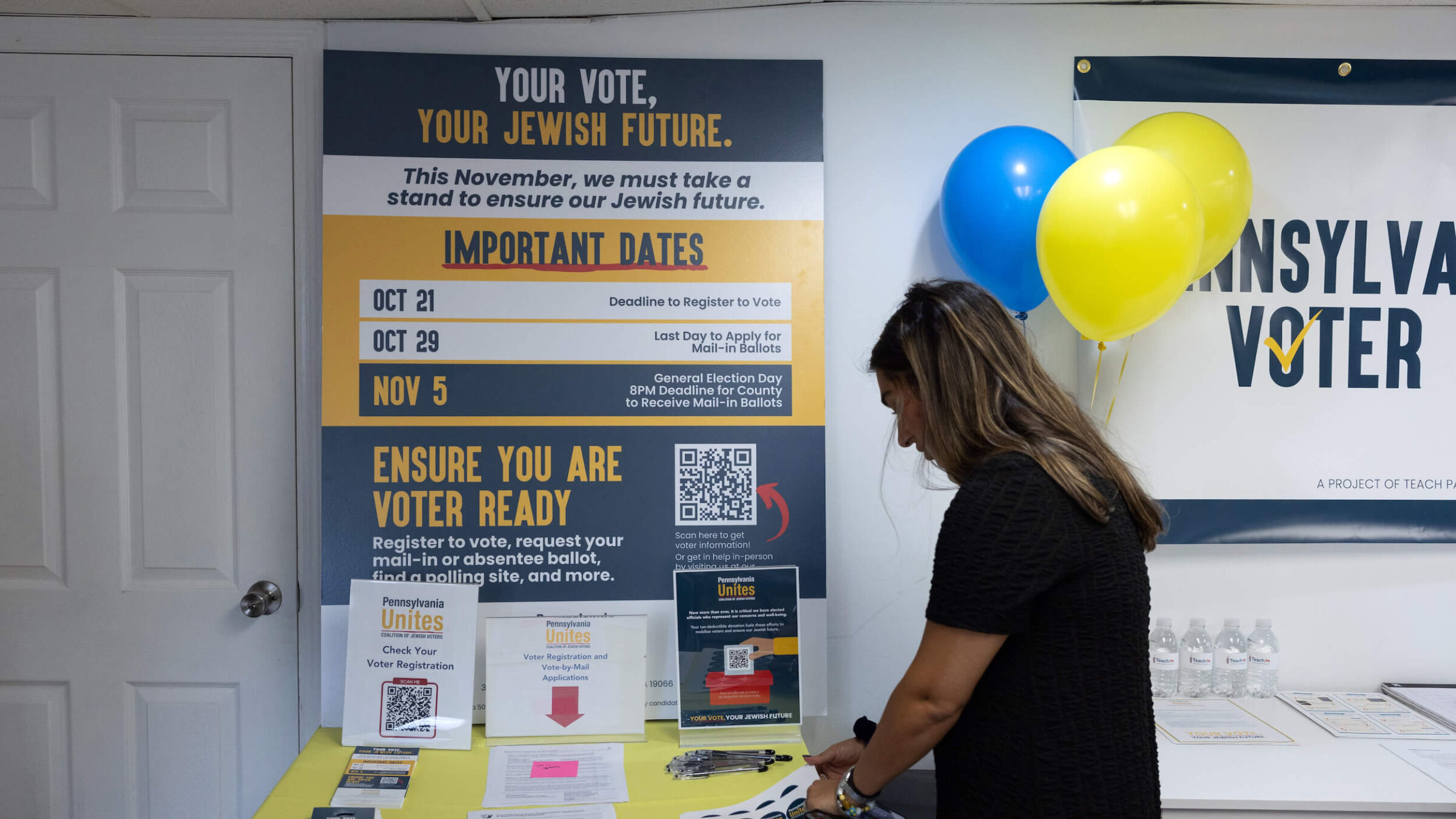I’m a Pennsylvania Jewish voter. My tiny demographic group could decide the election
One of the tightest races ever could come down to fewer than half a million voices just like mine

A woman takes a sticker at a Jewish Get Out The Vote center opened by Pennsylvania Unites in Merion Station, Pennsylvania, on Sept. 17. Photo by Rachel Wisniewski for the Washington Post/Getty Images
It is yet another oddity of the bizarre U.S. electoral system that my absentee vote in Montgomery County, Pennsylvania — cast from 6,000-odd miles away in Israel — will influence the outcome of next week’s presidential race much more than the votes of my friends in New York, Los Angeles, Chicago and Miami.
Which is to say: Even a tiny bit. Because in a year in which the reverberations of the Israel-Hamas war threaten to upend ordinary electoral arithmetic, there is a real chance that Pennsylvania Jewish voters like myself will decide whether Vice President Kamala Harris or former President Donald Trump will hold the White House.
The Keystone State has just under half a million Jews, significantly fewer than New York and California, and just shy of Florida and New Jersey’s numbers. But it is, crucially, the only state with a significant Jewish population that is also a battleground state — and in America’s peculiar electoral system, voters anywhere else basically don’t matter.
So if Trump can pull, say, some 30,000 more Jewish votes in Pennsylvania than he did in the last two elections, he would go a long way toward securing the must-win state’s 19 electoral votes. In Pennsylvania, the margin of victory in recent presidential races has been nail-bitingly close — about 80,000 votes for Joe Biden in 2020, and about 44,000 for Trump in 2016. Even a statistically small shift in the Pennsylvania Jewish vote could flip the scale as part of a broader erosion of Democratic support among other groups, including Latinos and Black men.
There has already been a decline in Jewish support for Democrats over the past decade, and there’s reason to think it might accelerate this year. U.S. Jews have, historically, overwhelmingly supported the Democrats: Bill Clinton, Al Gore and Barack Obama in his first campaign each won about 80% of Jewish voters. But since 2008, that figure has declined to around 70%, and there are some assessments — based in part on a shift in donations, especially from megadonors — that it will drop further still this time around.
There are basically two reasons for that.
First, there is a prevailing (if simplistic) sense that Trump is more pro-Israel, which may move voters at a time when the Jewish state is under particular duress over criticism of its conduct during the past year of multi-front war — especially in Gaza, where tens of thousands have died. While President Joe Biden’s administration has delivered significant material and political support for Israel’s war effort, it has also spent months at loggerheads with Prime Minister Benjamin Netanyahu over his lack of a strategic vision for peace, creating an ambient tension that has reflected back on Harris.
Second, there is a sense that concerns about antisemitism, which have usually favored liberal parties in the U.S. and elsewhere, are now benefitting the right. This is not because the far-right has become any less antisemitic, but rather because of the increasing sense that the progressive movement, which has focused much of its energy over the past year on vocally protesting Israel’s war, is unfriendly to Jews.
The tensions around this issue of progressive antisemitism and its offshoots, in particular, are huge.
There is a perception among some Jews that progressive ideology, with its focus on privilege and systemic inequities, frequently leaves Jews out of the conversation, or even portrays them in a negative light. That sentiment has grown amid the war, as progressive rhetoric conflating Jewish identity with wealth and privilege — a framing that some see as unfair or even antisemitic — has appeared to become more common, especially on elite U.S. campuses, as pro-Palestinian protests have in some cases reached the extremes of openly supporting the jihadi terrorists of Hamas.
Perhaps the poster child for this concern is in Pennsylvania: the Ivy League’s University of Pennsylvania.
When I attended the school, in the mid-1980s, more than a third of its students were Jewish. That proportion has been decimated, and these days Israeli students are admitted with great rarity. The alumni board in Israel — of which I am a member — has disassociated from the university, mainly but not exclusively over its failure to address antisemitism after Oct. 7. Over the past year, UPenn’s inability to stem the tide of antisemitism on its campus has repeatedly made national headlines, making growing tensions between progressives and liberal Jews one of the foremost national storylines around Pennsylvania in a year when its status as a swing state may prove particularly consequential.
These tensions have pushed at least some Jewish voters to reconsider their traditional alignment with the Democratic Party. But one thing working in Harris’ favor is that the proportion of Pennsylvania Jews who are Orthodox or ultra-Orthodox is fairly low — and it is these groups that are most likely to decisively turn out for Trump.
The majority of Jewish Americans prioritize liberal domestic issues like healthcare, social equality, and climate change, which favor the Democrats. As for the polarizing Trump, despite his strong support for Israel — or at least its right-wing leadership — his track record on issues like antisemitism within his own ranks, and his incendiary rhetoric could deter some Jewish voters.
Interestingly, Harris faces an inversion of the Pennsylvania problem in the battleground state of Michigan, where Muslim voters are angry over what they see as the Biden administration’s excessive support for Israel.
A loss of both of these states — one where Jews are critical, the other where Muslims are — would almost certainly mean a Trump return to the White House.
There are two ironies here. The first is that the very electoral system that sidelines most Jewish votes — concentrated as they are in reliably blue or red states — may now hinge on a swing state where they could be the deciding factor. The second is more brutal: A minor Jewish shift in the direction of Trump in the most critical of swing states could hand the White House to a boorish bigot who shares nothing with the Jewish traditions of scholarship, introspection and probity.















